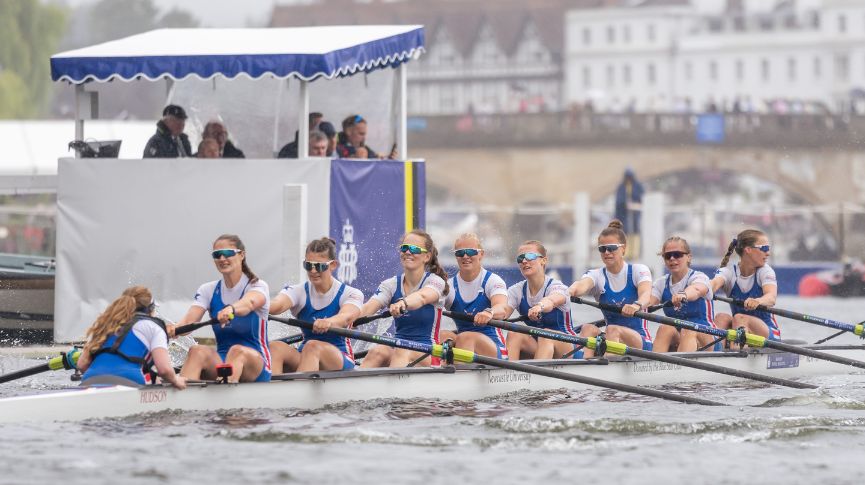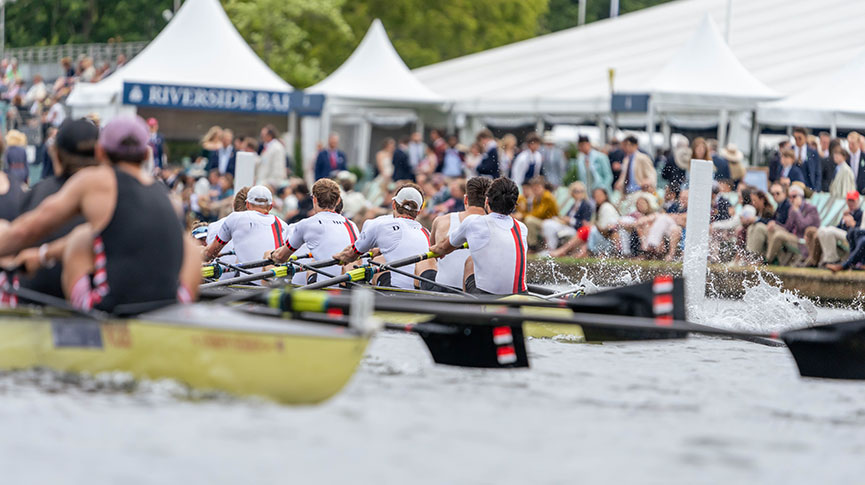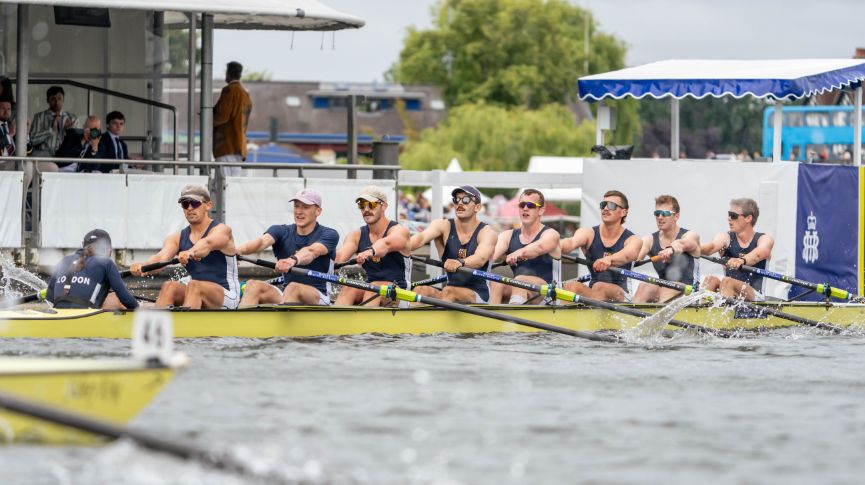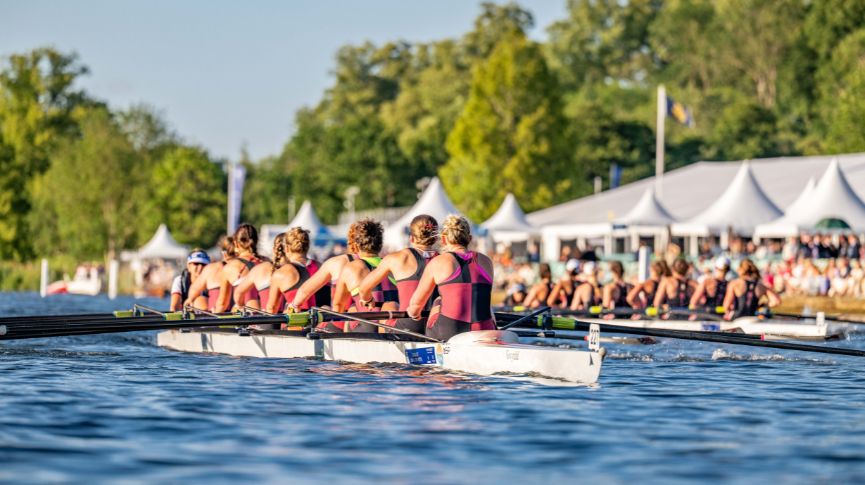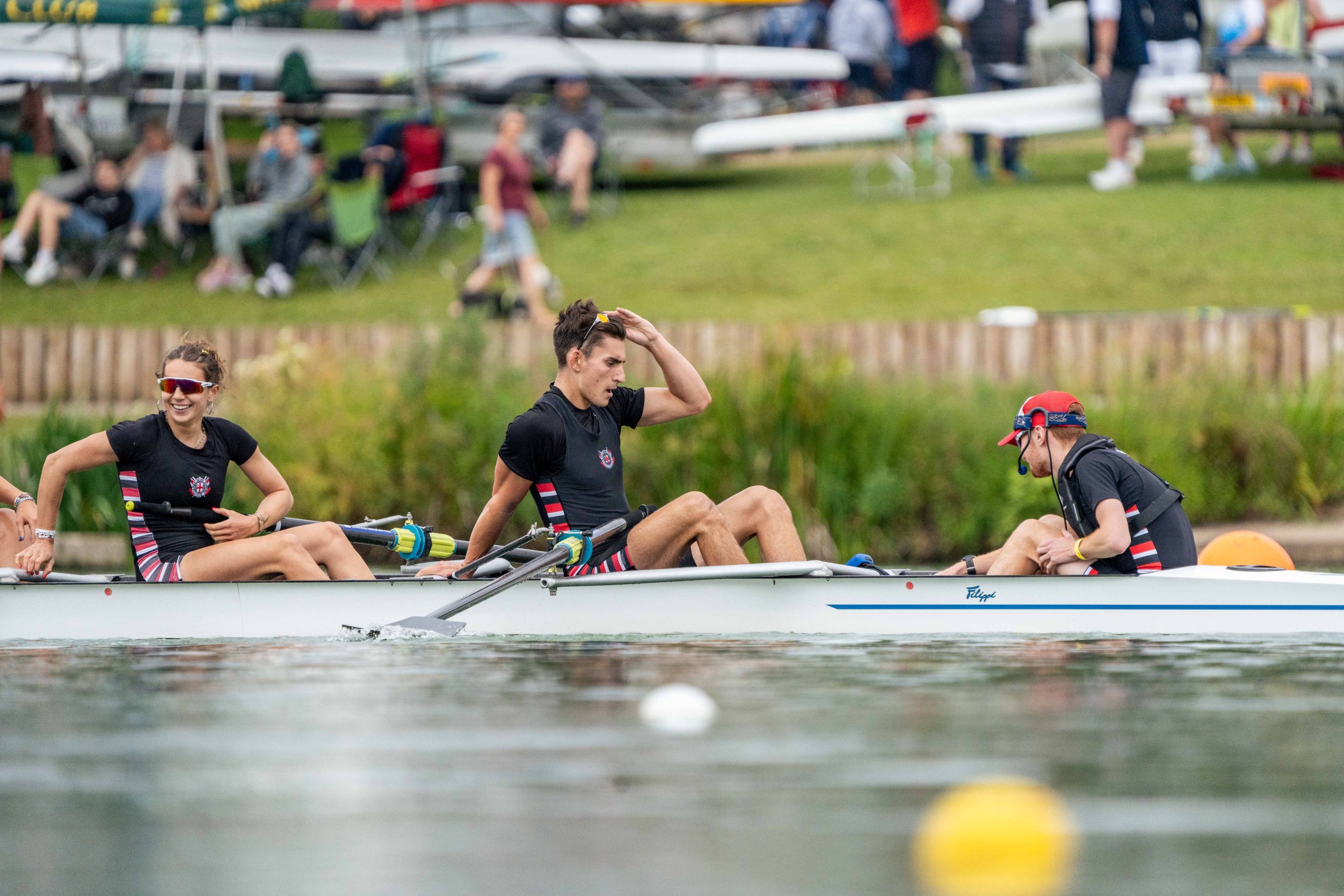Two golds in Munich
Alex Partridge, the man who missed Athens through illness, believes that the 2005 British men’s four needs to prove it is an "excellent" rather than just a "good" crew. They went some way to establishing their credentials in an event Britain has got used to winning when they stormed home in 6:20.97 to take their second world cup title of the season in Munich this afternoon.
News
Steve Williams, winner of gold in Athens, said that he, Partridge, Peter Reed and stroke Andy Hodge in the Camelot-backed crew had "got a lot of things right today" but
that the "big race" this season was still to come.
Britain’s other gold medal of the day came from the women’s quadruple scull, winners at Eton last month, and now also in pole position to take the overall World Cup title with one event to go.
The crew, stroked by double Olympic silver medallist Katherine Grainger moved ahead at 350m and had a clear water lead at the finish.
"We know that we have all the firepower we need in the boat", said Grainger afterwards. "It’s just a question of putting it all together".
This was a good regatta, too, for Britain’s lightweight crews who won two non-Olympic class medals – a silver and a bronze – and qualified a total of five boats for finals.
We had two fine gold medals today with our women’s quad and men’s four completely dominating their fields and that’s great for GB rowing. We’ve also got some seeds for the future in today’s strong final showing with a strong fourth place for our men’s quad and again two lightweight men’s crews showing well in the A final in the Olympic classes. Each of these crews have some young athletes who have the capacity to show in Beijing and that’s good news ", said David Tanner, GB team manager.
"I am delighted by two more gold medals after the two wins at Eton and Camelot is very proud to be associated with British rowing and these two fine crews", said Camelot Chief Executive, Diane Thompson.
The next BearingPoint World Cup is in Lucerne, Switzerland, from July 8-10.
SCROLL DOWN FOR MORE
=============================== ===============================
RACE REPORTS
The British men’s four are beginning to cause ripples in the world of rowing as a crew who could carry the extremely heavy mantle of expectation – placed upon them since the retirement of Sir Matthew Pinsent and Ed Coode and this year’s absence of James Cracknell – by a nation used to rowing men’s four gold
Today Steve Williams, Peter Reed, Alex Partridge and Andy Hodge were a boat length up on the field after 250m. They stretched that lead to five seconds by the half-way point.
The British quartet added another half-second to that lead by the 1500m mark with Italy still in second and Ireland in third.
Italy made up some but not much of the gap in the closing stages with the British still crew still looking controlled and contained in their rhythm. There was even energy left for a brief victory salute to the crowd.
"We got a lot of things right today", said Steve Williams part of the GB gold medal four in Athens. "It was nice after the first minute to have that much of a margin".
"We’ve got to be an excellent crew, we can’t just be a good crew", said Alex Partridge. "These races are all about working on our weaknesses".
The British women’s quadruple scull, also sponsored by Camelot and winner of the team’s second gold medal of the day, showed very few weaknesses on the 1972 Olympic course in Munich. Indeed there was a touch of metronomic mastery in the way they surged ahead of the Ukraine after 500m to create a clear water lead which they held until the finish line with little sign of slipping back.
In the first 200m the British crew got off to a good start and set themselves up nicely. By 350m they had got a whisker ahead and worked on their lead from there in.
Germany has won Gold in this event at each Olympic Games since it was introduced to the Programme in 1988 so it was an even more significant moment to beat two German crews on their home waters.
For Olympic silver medallist Katherine Grainger and the crew it was important to put behind them a poor performance at the Versailles Regatta two weeks ago.
"We know we have all the firepower we need", said Grainger afterwards. "It was just a question of putting it all together. We went back to basics after Versailles. The loss there kept us humble and perhaps it was the best thing that could have happened".
Leading sportsmen and women often say that finishing fourth is the "worst place of all". The young British men’s open weight quadruple scull should take a positive from their fourth place here, however,
They have proved their potential and the fact and still looked good as they raced towards the line. This was a race won by Slovenia in 6:03.42 with Poland in silver and the Czech Republic in third.
At the start of the men’s pair final Josh West, world silver medallist twice before in the four, and Kieran West, Olympic gold medallist in the eight in 2000, made sure they were with the pack and in contention off the start. By the 300m stage there was nothing to choose between the crews.
At the 500m mark they were second only to the Skelin brothers of Croatia before the New Zealanders made a move to push past them and slip into second.
Somewhere close to 750m into the race "the Wests", who are unrelated but also coached here by another namesake, John West, then caught a buoy which almost brought them to a stop. After that they struggled to re-establish themselves with Italy having passed them into third place.
At the head of the race, the New Zealand pairing of Nathan Twaddle and George Bridgewater provided some drama in the finishing 300m by blasting through the Skelins, reigning Olympic silver medallists to win in 6:59.82. Britain was fourth.
Given the quality of the women’s single scull event here in Munich, Debbie Flood, a relative novice at this level after several years in crew scull boats, had already done well to reach the final.
Drawn in lane six, she was behind at the 500m mark and never really recovered in a race won from the front in her trademark commanding style by the Olympic silver medallist from Athens, Ekaterina Karsten of Belarus in 7:58.02.
Mirka Knapkova of the Czech Republic was second with Georgina Evers-Swindell of New Zealand third. Flood, who has also had to contend with University finals recently, was sixth in 8:28.19.
"I had a hard race in qualifying yesterday and that took a lot out of me", said Flood afterwards. "Compared to the top scullers I am still a relative novice but with experience I’ll get better so that the gap between my good races and my bad races is not so big".
The British lightweight men’s four were fifth in their final today in a strong field for this Olympic-class boat. By the end they were just overlapping the fourth-placed German crew having fought back from sixth place at 1500m.
Stroked by Simon Jones, the crew has shown great promise here in an event in which Britain has not won a world cup medal since 1997.
In the men’s lightweight double Olympic class final only two seconds separated the six crews at 500m by the 1000m mark the British duo of Mark Hunter and James Lindsay-Fynn had hauled themselves into fourth place.
The damage was done from a British perspective in the third 500m with the crew slipping back to sixth and struggling to stay in contention.
For a relatively untried combination it was a feat to reach the final in a fiercely competitive boat class internationally.
The race was won by Italy in 6:54.15 with Germany second and Italy third. GB’s finishing time was 7:05.43.
Zac Purchase came into this regatta as the second string GB lightweight single sculler and the youngest member of the GB team. He has not wasted any time in proving his talent and potential. Today he led through much of the lightweight men’s single final before being overhauled by Ingo Euler of Germany at the 1500m.
The gutsy Marlow RC youngster continued to dig deep and held onto silver ahead of Gerard van der Linden of Holland in a time of 7:51.98.
A clearly delighted Purchase said: "I really can’t remember too much about the race, it was painful. I was aware that the German was up on me later on and I did try and claw it back a few times. I’m delighted, though. It’s my first proper senior medal at my first proper FISA event".
In the equivalent women’s event Jennifer Goldsack was left berating herself for just not being able to hold onto a medal position in the final 100m. She was in a good position coming past the grandstands but could not quite capitalise, eventually losing out to Daniela Nachazelova in a photo-finish for bronze. The race was won by Mirna Rajle of Croatia in 8:35.23. Goldsack’s time was 8:38.33.
Paul Mattick and Daniel Harte were clearly delighted with their bronze medal in the lightweight men’s pair in a race won by Italy whose crew both have an Olympic bronze medal to their name and who won in 7:20.16.
Mattick and Harte finished in 7:23.00 having held a consistent third place throughout the race. Chile was second.
"We started coming back at the end", said Mattick afterwards, "but it wasn’t enough". When the pressure came on us we weren’t quite in synch", added Harte, "but it’s still good to get a medal against those crews".
B Finals
In the Olympic-class B Finals Annie Vernon and Elise Laverick both received a boost to their confidence by upping their rate, picking up the pace and avoiding the potential to be "rowed down" near the line by Belarus.
They won in a time of 7:30.39 having led throughout the 2000m. Alex Gregory and Colin Smith came fifth in the men’s equivalent event in a time of 6:52.79 despite momentarily moving into fourth 200m from the line.
Britain’s lightweights opened up the B Final programme earlier in the day by winning both of the lightweight singles.
Naomi Hoogesteger led from the front throughout in the women’s race whilst Tim Male launched an attack in the final 500m which saw him move past Bine Pislar of Slovenia and hold off the challenge of Jiri Vlcek of Italy to win.
The lightweight women’s double of Helen Casey and Annie Vernon were second in their B Final in a tight decision from Sweden. Nick Wakefield and Matthew Beechey are still struggling to find form and were third in the lightweight men’s pair.
During the regatta a German and American women’s eight raced off over a 500m sprint course to raise awareness and money for a breast cancer charity. World Cup sponsor BearingPoint offered to double the amount raised by the event called the "Sprint for the Cure".
SCROLL DOWN FOR MORE
=============================== ===============================
GB RESULTS – FINALS
BearingPoint World Cup
Munich, 17-19 June
(crews from bow to stroke plus cox)
FINALS
OPEN
WOMEN
Single scull
1. Ekaterina Karsten (Belarus) 7:58.82
2. Mirka Knapkova (Czech Republic) 8:03.06
3. Georgina Evers-Swindell (New Zealand) 8:05.54
4. Caroline Evers-Swindell(New Zealand) 8:10.91
5. Sophie Balmary (France) 8:13.55
6. Debbie Flood (GREAT BRITAIN) 8:28.19
Quadruple scull
1. Rebecca Romero/Sarah Winckless/Frances
Houghton/Katherine Grainger (GREAT BRITAIN) 6:50.85
2. Ukraine 6:54.91
3. USA 6:57.45
4. Germany 2 7:00.61
5. Germany 1 7:03.05
MEN
Pair
1. Nathan Twaddle/George Bridgewater (New Zealand)
6:59.82
2. Sinisa & Niksa Skelin (Croatia) 7:05.59
3. Luca Agamennoni/Dario Lari (Italy) 7:08.14
4. Josh & Kieran West (GREAT BRITAIN) 7:17.26
5. Gregor Hauffe/Toni Seifert (Germany 2) 7:28.00
6. Tobias Kuehne/Jan Herzog* (Germany 1) DNS
* withdrew because a back injury
Four
1. Steve Williams/Peter Reed/Alex Partridge/
Andy Triggs Hodge (GREAT BRITAIN) 6:20.97
2. Italy 6:26.34
3. Ireland 6:30.11
4. Germany 2 6:31.45
5. Italy 2 6:32.26
Quadruple scull
1. Slovenia 6:03.42
2. Poland 6:05.69
3. Czech Republic 6:05.77
4. Matthew Wells/Stephen Rowbotham/Alan Campbell/
Matthew Langridge (GREAT BRITAIN) 6:11.65
5. Australia 6:13.17
6. Ukraine 6:24.35
LIGHTWEIGHT
WOMEN
Single scull
1. Mirna Rajle (Croatia) 8:35.23
2. Benedicte Luzuy (France) 8:37.05
3. Daniela Nachazelova (Czech Republic) 8:38.21
4. Jennifer Goldsack (GREAT BRITAIN) 8:38.33
5. Lea Fluri (Switzerland) 8:45.01
6. Michaela Taupe (Austria) 8:47.76
MEN
Pair
1. Salvatore Amitrano/Catello Amarante (Italy) 7:20.16
2. Felipe Leal Atero/Miguel Cerda Silva (Chile) 7:23.00
3. Paul Mattick/Daniel Harte (GREAT BRITAIN) 7:27.09
4. Ahmed Gad/Hossam Azouz (Egypt) 7:29.32
5. Alexander Bernhardt/Stefan Locher (Germany 1) 7:29.43
6. Ralf Batlasar/Jost Schoemann-Fink (Germany 2) 7:37.24
Four
1. France 6:28.48
2. Germany 1 6:30.56
3. Ireland 6:30.80
4. Germany 2 6:35.26
5. Nick English/Dave Currie/Mike Hennessy/
Simon Jones (GREAT BRITAIN) 6:37.25
6. Poland 2 6:38.97
Single scull
1. Ingo Euler (Germany) 7:49.28
2. Zac Purchase (GREAT BRITAIN) 7:51.98
3. Gerard van der Linden (Netherlands) 7:55.13
4. Peter Loerinczy (Hungary) 8:00.85
5. Marcello Miani (Italy1) 8:01.39
6. Jose Czcy (Argentina) 8:20.38
Double scull
1. Stefano Basilini/Leonardo Pettinari (Italy2) 6:54.15
2. Joerg Lehnigk/Manuel Brehmer (Germany) 6:56.23
3. Elia Luini/Bruno Mascarenhas (Italy 1) 6:58.33
4. Maros Sloboda/Lubos Podstupka (Slovakia) 7:00.14
5. Frederic Dufour/Arnaud Pornin (France) 7:00.45
6. Mark Hunter/James Lindsay-Fynn (GREAT BRITAIN) 7:05.43
B FINALS
OPEN
WOMEN
Double scull
1. Elise Laverick/Annie Vernon (GREAT BRITAIN) 7:30.39
2. Volha Berazniova/Hanna Nakhayeva (Belarus1) 7:31.12
3. Marianne Nordahl/Heidi Veeser (Norway) 7:40.04
4. Gisella & Gabriella Bascelli (Italy 2) 7:40.04
5. Nadzeya Snapkouskaya/Alina Makhneva (Belarus 2) 7:48.29
MEN
Double scull
1. Stijn Smulders/Christophe Raes (Belgium) 6:47.31
2. Nils-Torolv Simonsen/Morten Adamsen 6:47.91
3. Florian Stofer/Olivier Gremaud (Switzerland) 6:49.54
4. Michal Sloma/Adam Wojciechowski (Poland) 6:52.70
5. Alex Gregory/Colin Smith (GREAT BRITAIN) 6:52.79
6. Mario Vekic/Ante Kusurin (Croatia) 6:54.32
LIGHTWEIGHT
WOMEN
Single scull
1. Naomi Hoogesteger (GREAT BRITAIN) 8:28.11
2. Lara De Stefano (Italy) 8:32.45
3. Hilde Gudem (Norway) 8:33.72
4. Lena Kersten (Germany) 8:40.02
5. Ilona Hiltunen (Finland) 8:40.91
6. Tina Jaklic (Slovenia) 8:50.74
Double scull
1. Niamh Ni Cheilleacher/Heather Boyle (Ireland) 7:44.30
2. Jo Hammond/Helen Casey (GREAT BRITAIN) 7:48.24
3. Lena & Sara Karlsson (Sweden) 7:48.75
4. Ka Yan Yung/Siu Man Tong 8:25.82
MEN
Pair
1. Simon Stellmer/Mark Rippel (Germany 4) 7:17.49
2. Andreas Toennies/Matthias Bergmann (Germany 3) 7:19.09
3. Matthew Beechey/Nick Wakefield (GREAT BRITAIN 1) 7:21.93
4. Chile DNS
Single scull
1. Tim Male (GREAT BRITAIN) 7:30.34
2. Bine Pislar (Slovenia 1) 7:32.44
3. Jiri Vlcek (Italy 2) 7:32.61
4. Lukas Babac (Slovakia) 7:35.08
5. Frederic Hanselmann (Switzerland2) 7:38.22
6. Rolandas Zaklauskas (Hong Kong 2) 7:47.99


